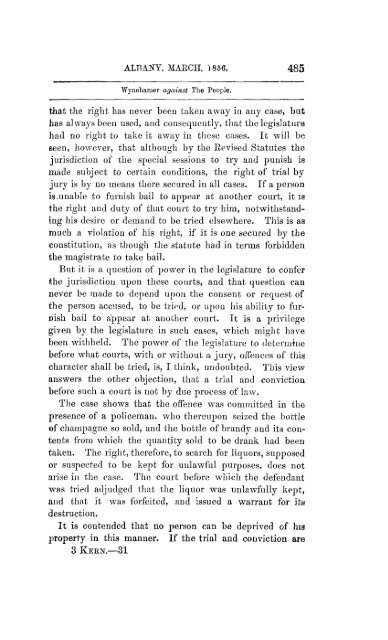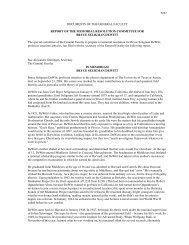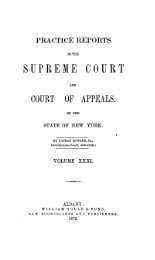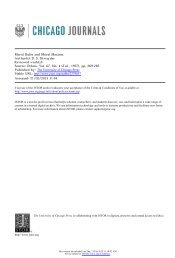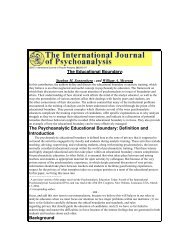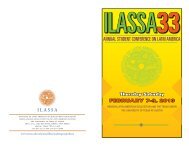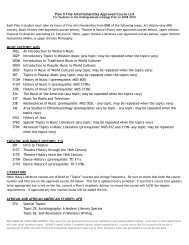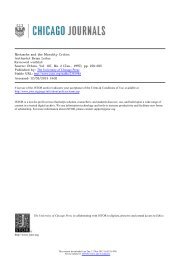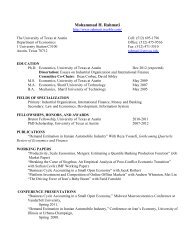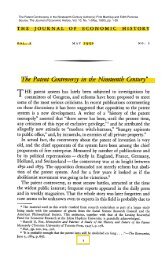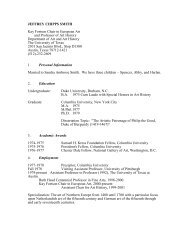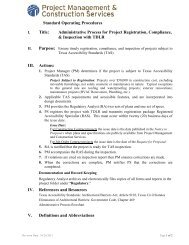Wynehamer v People.pdf - The University of Texas at Austin
Wynehamer v People.pdf - The University of Texas at Austin
Wynehamer v People.pdf - The University of Texas at Austin
You also want an ePaper? Increase the reach of your titles
YUMPU automatically turns print PDFs into web optimized ePapers that Google loves.
ALBANY, MAECH, 1856. 485<strong>Wynehamer</strong> against <strong>The</strong> <strong>People</strong>.th<strong>at</strong> the right has never been taken away in any case, buthas always been used, and consequently, th<strong>at</strong> the legisl<strong>at</strong>urehad no right to take it away in these cases. It will beseen, however, th<strong>at</strong> although by the Revised St<strong>at</strong>utes thejurisdiction <strong>of</strong> the special sessions to try and punish ismade subject to certain conditions, the right <strong>of</strong> trial byjury is by no means there secured in all cases. If a personis .unable to furnish bail to appear <strong>at</strong> another court, it isthe right and duty <strong>of</strong> th<strong>at</strong> court to try him, notwithstandinghis desire or demand to be tried elsewhere. This is asmuch a viol<strong>at</strong>ion <strong>of</strong> his right, if it is one secured by theconstitution, as though the st<strong>at</strong>ute had in terms forbiddenthe magistr<strong>at</strong>e to take bail.But it is a question <strong>of</strong> power in the legisl<strong>at</strong>ure to conferthe jurisdiction upon these courts, and th<strong>at</strong> question cannever be made to depend upon the consent or request <strong>of</strong>the person accused, to be tried, or upon his ability to fur-Dish bail to appear <strong>at</strong> another court. It is a privilegegiven by the legisl<strong>at</strong>ure in such cases, which might havebeen withheld. <strong>The</strong> power <strong>of</strong> the legisl<strong>at</strong>ure to determinebefore wh<strong>at</strong> courts, with or without a jury, <strong>of</strong>fences <strong>of</strong> thischaracter .shall be tried, is, I think, undoubted. This viewanswers the other objection, th<strong>at</strong> a trial and convictionbefore such a court is not by due process <strong>of</strong> law.<strong>The</strong> case shows th<strong>at</strong> the <strong>of</strong>fence was committed in thepresence <strong>of</strong> a policeman, who thereupon seized the bottle<strong>of</strong> champagne so sold, and the bottle <strong>of</strong> brandy and its contentsfrom which the quantity sold to be drank had beentaken. <strong>The</strong> right, therefore, to search for liquors, supposedor suspected to be kept for unlawful purposes, does notarise in the case. <strong>The</strong> court before which the defendantwas tried adjudged th<strong>at</strong> the liquor was unlawfully kept,and th<strong>at</strong> it was forfeited, and issued a warrant for itsdestruction.It is contended th<strong>at</strong> no person can be deprived <strong>of</strong> hiaproperty in this manner. If the trial and conviction are3 KERN.—31


